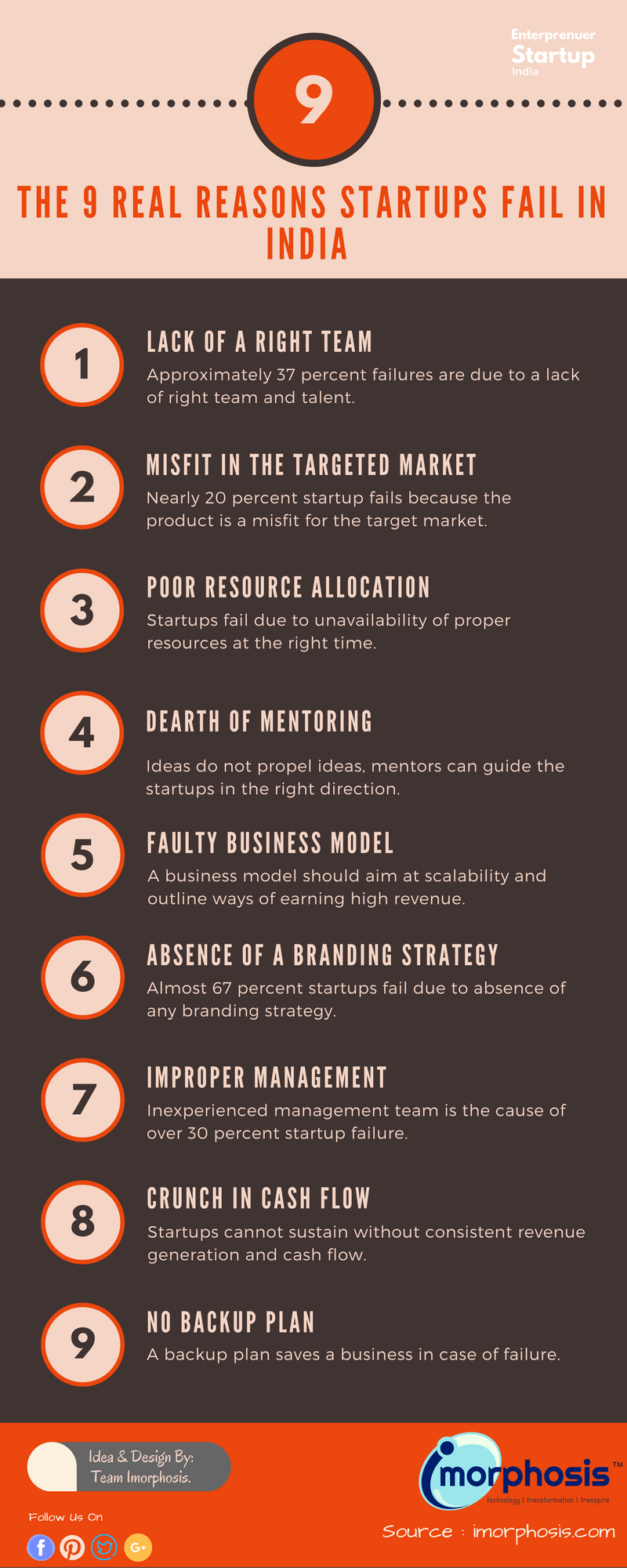Startup is the new “in” thing in the business ecosystem. With investment worth almost $ 5 billion in the year 2015 and approximately three startups, emerging every day, India stands in the third position worldwide in terms of startups. A report by NASSCOM and Zinnov , by evaluating the present scenario and trends predict that, India will position as an attractive destination for both corporate and investors. Statistics prove that in the country, there has been 2.3x growth in the number of active startup investors.
But all the startups do not rise to the zenith of success. There are many failed startups in India that could not execute their ideas and transform their dream to reality. Industry leaders predict that 9 out of 10 startups fails . Many industry experts, entrepreneurs and investors have conducted failure post-mortem, a cliche wide used in Silicon Valley and across the globe, to identify the reasons or factors responsible for the catastrophe.
To share this Image on your Site:
Lessons learnt from failed startups in India
When a startup fails, often the investors blame managers, managers blame the R&D team and the chain goes on. But, to prevent such untoward situation, first step is to identify the roadblocks that startups might face and take necessary measures. It is better to learn from the experience of other startups than from your own mistakes.
A survey highlight the major reasons for failed startups in India- 98 percent due to business models, 87 percent due to poor management and 91 percent due to financial issues.
In a survey conducted by a magazine and tech blog- CoFounder and ArcticStartup respectively, almost hundred entrepreneurs have shared their learning and experience related to startups. Below mentioned are the challenges that failed startups in India have faced as highlighted in different surveys and studies.
1. Right talent and team to execute projects – Hiring the right talent is actually an uphill task for any startup. According to almost 37 percent entrepreneurs, having the right team is the biggest challenge for any startup. It is important to have a team of diverse talents and skill for succeeding.
Investors emphasize on a balanced team as it is the key to success of startup software companies. With time ideas change, markets might react differently, expectation of customers vary, but your team will hold things together. A great team is not about having the best talents, but a passionate team that complements each other’s strength and weakness. Management has to believe the team and assign them responsibilities to which they will be accountable for.
While recruiting human resources, make sure that you hire the right talent in the context of your vision, industry and technology to be used. For retaining skilled manpower, you cannot offer them a salary lower than other corporate. Rather, you have to motivate them and imbibe in them the passion that you have for the venture.
2. Product or solution is a misfit in the targeted market – 20 percent of the entrepreneurs who participated in the survey believed that startup fails because the product is a misfit for the target market. It is not an isolated incident often startups fail to understand the market or need of their targeted audiences. If it fails to do so, it is alarming, the company might go astray, or emphasize on multiple ideas rather than the core one.
An entrepreneur might consider their product or solution to be the best and unique. But, the consumers might not think the same. Various reports prove that customers are often biased about new products that hits the market. It is best to consider the market realities prior to launching products or services.
Another reason for startups to face setback is ignorance of the competition. If the survey findings are to be believed, then it contributes to almost 19 percent of startup failures. To avoid this disaster, the best way is to identify what you are doing new or unique that your competitors are not doing or offering.
3. Poor resource allocation – A sound plan is a must. Be it about allocation of human resources in different stages of operation or the financial investment. Usually startups fall short of resources due to poor management, improper budget allocation and lack of foresightedness.
People and processes are two important resources for any startup and they need to invest both money and time for it. Importance of human resources has already discussed earlier. So, the next most important thing is processes and systems. Measurable and scalable processes decide success of any startup. Your business plan should accommodate the scaling up of business operations.
There should be systems that help businesses to handle different situations. Well-defined structures let startup software companies stay organized and operate consistently. Apart from this, friendly regulations, enabling environment, uninterrupted power supply and logistics support are required to avoid any hindrances that might crop-up anytime.
4. Dearth of mentoring – Ideas alone cannot make a startup work. Entrepreneurs are full of ideas, but they lack in experience. In the Indian Startup scenario, lack of guidance is one of the major roadblocks faced. Business experience, industry insights and market knowledge gives wings to the idea and materializes it. Mentors are the most valuable resources for any startup.
A mentor will guide the business in the right path. They will propel your ideas with their experience. Their experience will help in predicting the challenges that a startup might face in due course. They can help the business to spread the network by developing important networks, as the mentor is already a known name in the particular niche.
5. Faulty Business Model– A major reason for failed startups in India is the optimism of the entrepreneur. Many of them think that an interesting website and innovative products or services will help them to win the game. Well, this might be true initially, but in the long run winning customers will turn out to be an uphill task.
Few startups have business plans where the cost of customer acquisition is more than the revenue they earn. In an ideal situation, it should be- acquire the targeted customers with less investment and ensure that the return is high. Entrepreneurs need to focus on the actual cost required for customer acquisition. So, while deciding a business model, you need to emphasize on scalability and yielding high return in comparison to acquisition cost.
However a word of caution- replicating a business model that is successful in other parts of the world might not work out in India. Entrepreneurs need to understand that in India the scenario is different.
6. Absence of a Branding Strategy – Branding is essential for any startup. If they do not pay heed to it in the initial phase, the impact will resonate for a long time and it will be irreversible. It is estimated that almost 67 percent of startups fail due to lack of branding. Branding should start right from the launch of a startup. The aim is to advertise about the business and popularize it in the relevant niches.
Startups should formulate an effective strategy for branding based on the business objective. Having a strategy makes the process of branding organized. It is also a far-sighted approach that helps in attaining your goal. A sound branding strategy lies to the core of your success. Your products and human resources might change, but an established brand will pave way to success.
7. Inadequate Management – A recurrent problem of startup is a weak management team. Over 30 percent of the startup fail because the management is not experienced enough to handle human resources, processes and finances. Inexperience leads to making wrong strategy about the products, project execution and recruitment. Owing to these incorrect strategies, the company suffer badly.
Often there are too many minds in the management that prevents in setting long-term goals rather they get stuck in daily activities. Hence, you need a skilled and experienced management team. A good management team is comprised of diverse skills and ensures sustainability. They need to take into consideration the present market, emerging competitors and other challenges.
8. Crunch in cash flow – Dearth of cash flow is another causative agent of the staggering number of failed startups in India. Businesses fail not because they are bankrupt but, they go low on cash. A sound business plan ensures that there is a consistent cash flow. Entrepreneurs need to set a specific budget for all the activities and maintain it ardently.
A business may raise funds from different sources, but it is equally important for them to have a consistent revenue generation. It is advisable to have a control on the cash flow. The challenge of a startup is to generate revenue to support the maintenance, expansion and sustenance of the processes.
Having an emergency fund can be of great help to the entrepreneurs. It will help in covering various expenses if they have suffered any loss or when clients renege payments. The emergency fund can support the business till the cash flow is steady and there is financial stability.
9. No backup plan – A backup reduces the risk of any startup as it prepares the entrepreneurs for the rainy days. There are many startups who have full faith in their new venture and do not have any backup plan in place. But, they fail to realize that the backup plan will keep their company afloat.
For instance, if the marketing team fails to sell the product then what will you do? Should you close the operations and bear the loss of billions of money, lay off your human resources and experience the domino effect that will follow or should you opt for a different plan?
A backup plan if taken seriously right from the onset, will rescue you even when things have gone haywire. However, startup software companies need to ensure that are logistic arrangement that helps you in executing the backup plan.
Apart from the above mentioned factors, entrepreneurs or the decision makers should consider the government policies, permission, fund raising and competition in the particular niche.
Reality check Must for startup software companies
A reality check will highlight the opportunities and challenges that exist and help entrepreneurs to plan accordingly. So, before you launch a startup, make sure to assess the current market scenario and make business plans and formulate strategies accordingly to ensure success. Indian IT services companies have a long way to go. A paying customer will let a business to succeed in the competitive startup ecosystem. Companies that can solve the real-time problems, create realistic business models and focus on better financial management can go a long way and brand themselves successfully.





Pingback: 9 Genuine Reasons for failed Startups in India ...()